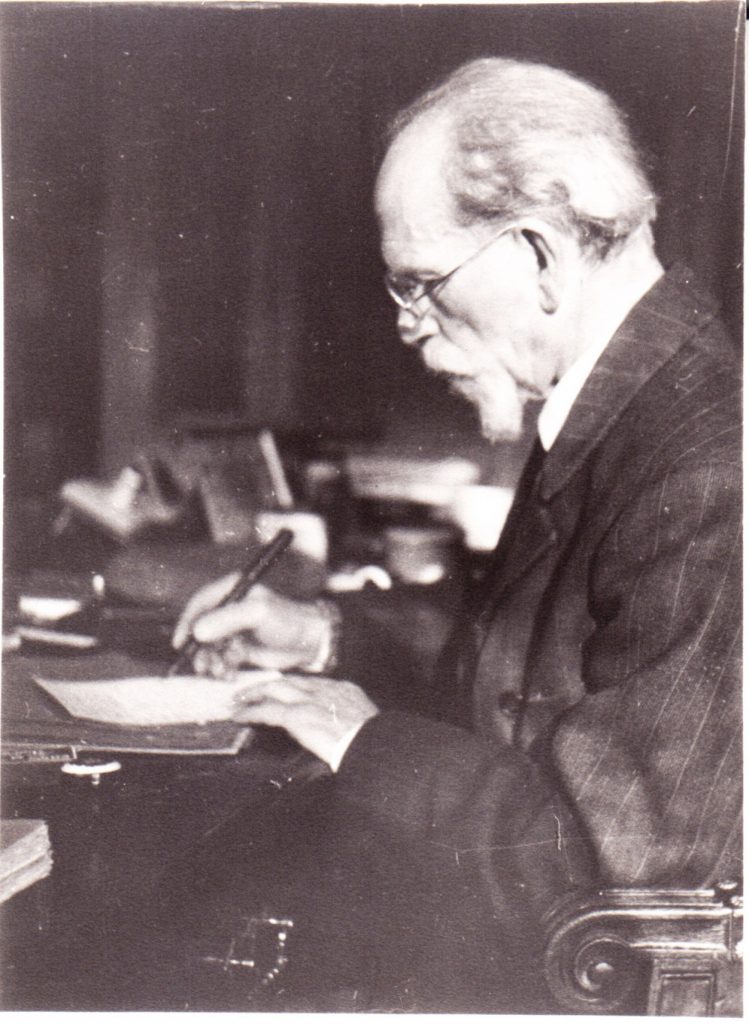Edmund Husserl (1859-1938) is considered the founder of phenomenology and one of the most influential representatives of philosophy in the 20th century. In 1916, he moved from Göttingen to the University of Freiburg and realigned its philosophical profile, which was characterised by neo-Kantianism.
In the years that followed, Husserl became increasingly well-known. An appointment to the University of Berlin in 1923, honorary doctorates, memberships in scientific academies (London, Paris, Boston) and lectures at important universities increased Husserl’s reputation and attracted scholars and students from all over the world to Freiburg. His students included Edith Stein and Martin Heidegger, whose academic career Husserl strongly supported.
Edmund Husserl, a mathematician with a doctorate and habilitated philosopher, placed the search “for a descriptive language for feeling, perceiving and recognising the world of life”[1] at the centre of his work and made Freiburg a centre of phenomenology with international appeal. Difficult-to-access texts, complex trains of thought and the aspiration to establish philosophy as a rigorous science made him a so-called ‘philosopher for philosophers’, according to Prof. Dr Hans-Helmuth Gander, former director of the Husserl Archive at the University of Freiburg.
Husserl was given emeritus status in 1928, but continued to give lectures. After the National Socialists came to power, Husserl was quickly and increasingly marginalised at his own university because of his Jewish origins. Although the University celebrated Husserl’s 50th doctoral anniversary with great ceremony on 23 January 1933, it withdrew his teaching licence on 6 April 1933. As rector, Martin Heidegger – Husserl’s closest colleague from 1916 to 1922 and his successor to the professorship from 1928 – placed himself at the service of the new rulers and therefore did nothing to protect his teacher. From 1936, Husserl’s name disappeared from all university directories. Even Husserl’s death on 27 April 1938 was not officially acknowledged by the University. Anyone who wanted to stand by him loyally despite the reprisals at the time had to do so as private individuals, such as Eugen Fink, his former assistant, or the Freiburg couple Walter and Edith Eucken.[2]
Husserl left behind more than 40,000 stenographed manuscript pages. [3] The Belgian Franciscan Father Hermann Leo van Breda rescued Husserl’s estate from the National Socialists and brought it to Leuven in Belgium, where the first Husserl archive was founded at the Catholic University in 1939. Another followed in Freiburg in 1950 on the initiative of Eugen Fink, who held the professorship for philosophy and educational science here after the war. A third was established at the University of Cologne in 1951.[4] The Freiburg Husserl Archive was initially conceived as a research centre. For Hans-Helmuth Gander, the appointment of Eugen Fink and the founding of the Husserl Archive in Freiburg testify to a clear desire for a new beginning and a commitment to continuing the phenomenological tradition. Later, the Freiburg archive, together with the archives in Leuven and Cologne, oversaw the publication of Edmund Husserl’s Collected Works as an editorial archive. As an internationally networked research centre for classical and modern phenomenology, it now promotes Freiburg’s reputation as a centre of innovation and tradition in phenomenological philosophy.
Today, the University takes a critical look at its own history and the actions of the University of Freiburg during the Nazi regime. The memorial, which was initiated in 2003 by the then Rector Wolfgang Jäger and created by the Cologne artist Marcel Odenbach, also stands for reflection as shown by the names of those University members who were wronged by the University as a Nazi institution and who were dismissed, exmatriculated or otherwise discriminated against, persecuted and murdered for racist or political reasons are listed in the entrance hall of the Collegiate Building I. The memorial should be understood as a living object and can, if further fates of victims discriminated against and persecuted during the Nazi era become known, be supplemented by further names. At this location, the fate of the victims should be a permanent and everyday part of the University’s memory.
[1] Hans-Helmuth Gander, „Edmund Husserl (1859-1938). Leben, Werk, Archiv in Freiburg“, p. 484, in: Landesverein Badische Heimat e. V. (Hrsg.), Badische Heimat. Mein Heimatland. Zeitschrift für Landes- und Volkskunde, Natur-, Umwelt- und Denkmalschutz, Heft 3, September 2013 / 93. Jahrgang, Rombach Verlag (pp.481-489).
[2] Ebd. p.483 ff.
[3] Ebd. p. 483 ff.
[4] https://www.husserlarchiv.uni-freiburg.de/archiv-en/archiv-en?set_language=en

